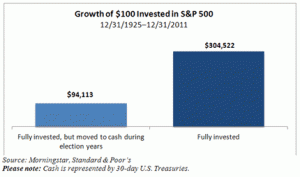Is the current political race getting in the way of your financial plan? Depending on the way the data is manipulated, one may come to the conclusion that the market itself predicts the presidential election or that the party in office dictates the ensuing returns. If you’re paying attention to pundits, you may well want to sit on the sidelines while things shake out.
Ultimately, that decision lies with you. But consider the following propositions before you vote on a specific action—or inaction.
- Markets tend to be party-neutral over time. Based on data from Morningstar®, the S&P 500 Index’s average annual return was negative in only four election years; in two—1940 and 2000—a Democrat was in office, and in the other two—1932 and 2008—a Republican was in office. Otherwise, the average return during the last 21 presidential election years is 11 percent, which is very close to the average return of all years between 1925 and 2011, based on return data from Standard & Poor’s.
- A vote against timing the market. Attempting to gauge the right time to get in or out of the market can be a losing proposition, as noted by the chart below.

- From the White House to your house. Regardless of who lives in the White House, most of us are more interested in our own financial house. There are numerous factors that can affect your long-term financial strategy. The top four are:
- Inflation. In order to maintain your standard of living over time, your assets need to keep up with inflation. Inflation is generally measured by the Consumer Price Index (CPI), which jumped from 1.6 percent in 2010 to 3.2 percent in 2011. It’s widely thought that inflation will remain low for some time; however, keep in mind that the CPI does not measure two consumer goods near and dear to your bottom line—gas and groceries.
- Interest rates. The federal funds rate, influenced by Federal Reserve policy, dictates short-term interest rates. Interest rates are low and are expected to remain so for some time, which is good news if you have outstanding debt that can be refinanced. It could also mean, however, that your investments in fixed income may be producing a yield lower than the rate of inflation.
- Market volatility. Peaks and valleys aside, over the long term the market has remained an effective hedge against inflation. As previously discussed, it’s easy to panic when things get bumpy, but reacting to fear can result in lost opportunity.
- Taxes. Tax increases are always a concern, no matter who is Commander-in-Chief. A financial professional can advise you on the best mix of taxable, tax-deferred, and tax-free investments for you.
A trusted advisor can help you develop a strategy around all of these factors—and more. Even the best politician would be nothing without advisors and strategy, so embrace the spirit of the election by adopting these two timeless tactics.
And remember . . . Presidential candidates and agendas are based on four-year plans, but your personal financial plan is based on a much longer timeline. So, ask yourself: Will your current strategy last as long as campaign promises or throughout the long term?
Certain sections of this commentary contain forward-looking statements that are based on our reasonable expectations, estimates, projections, and assumptions. Forward-looking statements are not guarantees of future performance and involve certain risks and uncertainties, which are difficult to predict. Past performance is not indicative of future results. Diversification does not assure a profit or protect against loss in declining markets. All indices are unmanaged and investors cannot invest directly into an index. The S&P 500 Index is a broad-based measurement of changes in stock market conditions based on the average performance of 500 widely held common stocks.


